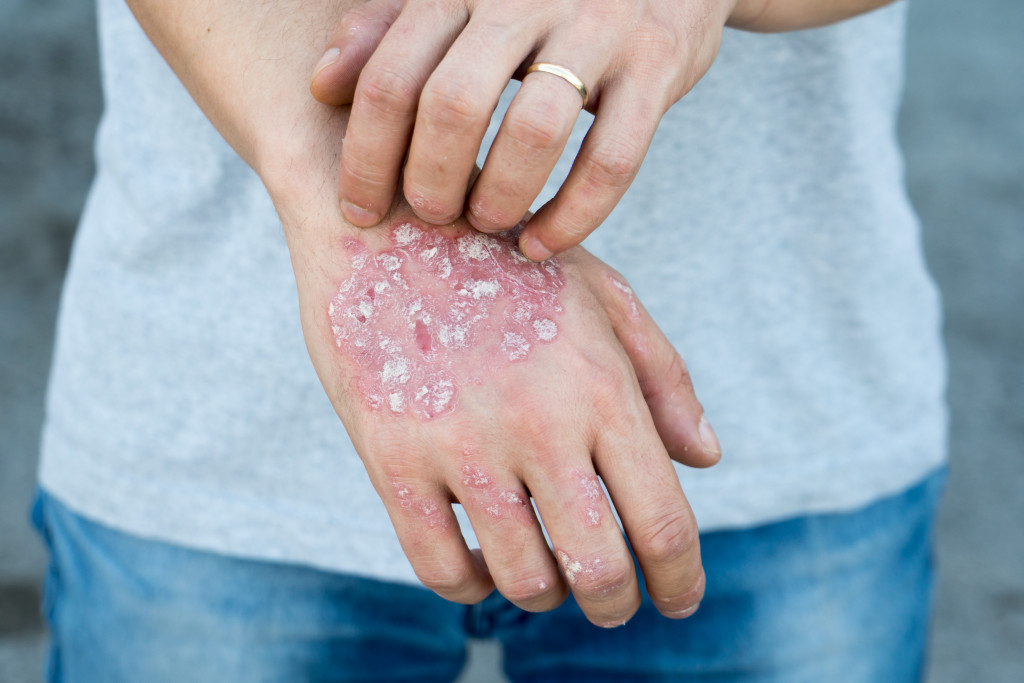- Eczema is a common skin condition with itchy, dry, and inflamed patches caused by an overactive immune response.
- Genetics, environmental factors, and age are risk factors for developing eczema.
- Common symptoms include dryness, itchiness, redness, swelling, flaking, and thickening/darkening of the skin.
- Treatments include skin products, prescription medications, natural treatments, and light therapy.
- With the right care and treatment, eczema can be managed successfully and kept under control.
Eczema is a common skin condition that affects millions of people worldwide. Itchy, dry, and inflamed patches on the skin characterize it. While eczema has no cure, many treatments are available to help manage symptoms and reduce discomfort. It’s one of the most common skin disorders in the U.K. If you or someone you know suffers from eczema, this guide will provide you with a comprehensive overview of the condition so you can better understand its causes and treatment options.
What Causes Eczema?
The exact cause of eczema is unknown, but it is believed to be related to an overactive immune response triggered by environmental triggers such as allergens or irritants. Here are some known risk factors for this skin disorder:

Genetics
One of the most significant risk factors for developing eczema is genetics. You are more likely to develop this condition if you have a family history of eczema or other allergies. In particular, if both parents have allergies or asthma, their child has a higher chance of developing eczema.
Environmental Factors
Certain environmental factors can increase your chances of getting eczema. These include exposure to dust mites, pet dander, and certain chemicals or fragrances in cleaning products or laundry detergents. Additionally, extreme weather conditions like high heat and low humidity may trigger eczema flare-ups.
Age
Age is another crucial factor to consider when it comes to managing eczema. Children are especially prone to this condition due to their immature immune systems and because they often spend more time indoors, where allergens and irritants abound. Adults who develop eczema later in life tend to have less severe cases than those who develop the condition in childhood. However, adult-onset eczema does tend to be more persistent than childhood-onset cases.
Common Symptoms of Eczema
The most common symptoms of eczema include dryness and itchiness in the affected areas of the skin. This can lead to inflammation which may present as redness and swelling on the skin’s surface. Other symptoms may include flaking or cracking of the skin due to excessive dryness and thickening or darkening of the skin in some cases. In severe cases, blisters may form, which can be painful and uncomfortable if left untreated.
Treatments For Eczema
Thankfully, there are various treatments for eczema. Here are some of those treatment options:
Skin Products
If you want to prevent eczema, you need to put extra care on your skin. Buying the best skin care products available to you can help. This is because some products are explicitly designed to minimize symptoms of eczema and keep your skin healthy. These products are often formulated with soothing ingredients such as aloe vera, colloidal oatmeal, and ceramides which can help lock in moisture and reduce inflammation.

Prescription Medications
If home remedies fail to relieve eczema, your doctor may suggest prescription medications such as topical corticosteroids or immunomodulators. These can help to reduce inflammation and itching caused by the condition. Additionally, oral antibiotics or anti-inflammatory drugs may be prescribed for severe cases of eczema.
Botox
Botox is a cosmetic procedure that can help reduce wrinkles and fine lines. It works by blocking nerve signals in the muscles, preventing them from contracting. This helps relax the facial muscles, resulting in a smoother and younger-looking appearance. It’s also been shown to be effective for treating certain types of eczema.
Natural Treatment
There are also natural treatments for eczema, such as herbal remedies, diet changes, and lifestyle modifications. Some foods like fish oil and turmeric are thought to help reduce inflammation associated with this condition. Additionally, avoiding triggers like dust mites or pet dander is essential in managing your symptoms. Finally, stress management techniques such as yoga or guided meditation can help reduce the chance of getting this skin disorder.
Light Therapy
Another treatment option for eczema is light therapy, which involves exposing the skin to ultraviolet (UV) light. This therapy has been proven effective in reducing inflammation and itching associated with eczema.
Eczema is a common skin condition that can be managed with proper care and treatment. Understanding what causes this condition and how it can be treated can help you manage your symptoms and reduce discomfort. You can keep your skin healthy and free from eczema flare-ups with the right treatments and care.
